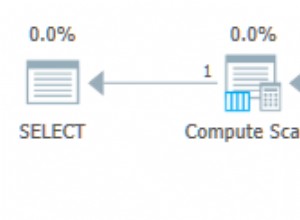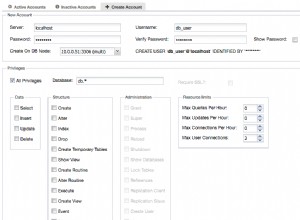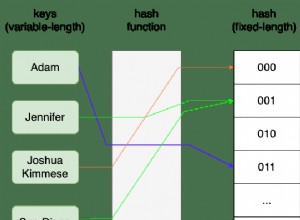Versioni attuali di jOOQ
jOOQ ha il supporto nativo per JSON e JSONB tipi di dati, quindi non devi fare nulla di specifico.
Risposta storica
A partire da jOOQ 3.5, puoi registrare i tuoi tipi di dati personalizzati nel generatore di codice come è documentato qui:
https://www.jooq.org/doc/latest/manual/code-generation/custom-data-type-bindings
A differenza di un Converter , un Binding determina come il tuo tipo di dati viene gestito a livello JDBC all'interno di jOOQ, senza che jOOQ sappia della tua implementazione. Cioè, non solo definirai come convertire tra <T> e <U> tipi (T =tipo di database, U =tipo utente), ma potrai anche definire come sono tali tipi:
- Reso come SQL
- Legato a PreparedStatements
- Legato a SQLOutput
- Registrato in CallableStatements come parametri OUT
- Recuperato da ResultSets
- Recuperato da SQLInput
- Recuperato da CallableStatements come parametri OUT
Un esempio Binding da utilizzare con Jackson per produrre JsonNode i tipi sono indicati qui:
public class PostgresJSONJacksonJsonNodeBinding
implements Binding<Object, JsonNode> {
@Override
public Converter<Object, JsonNode> converter() {
return new PostgresJSONJacksonJsonNodeConverter();
}
@Override
public void sql(BindingSQLContext<JsonNode> ctx) throws SQLException {
// This ::json cast is explicitly needed by PostgreSQL:
ctx.render().visit(DSL.val(ctx.convert(converter()).value())).sql("::json");
}
@Override
public void register(BindingRegisterContext<JsonNode> ctx) throws SQLException {
ctx.statement().registerOutParameter(ctx.index(), Types.VARCHAR);
}
@Override
public void set(BindingSetStatementContext<JsonNode> ctx) throws SQLException {
ctx.statement().setString(
ctx.index(),
Objects.toString(ctx.convert(converter()).value()));
}
@Override
public void get(BindingGetResultSetContext<JsonNode> ctx) throws SQLException {
ctx.convert(converter()).value(ctx.resultSet().getString(ctx.index()));
}
@Override
public void get(BindingGetStatementContext<JsonNode> ctx) throws SQLException {
ctx.convert(converter()).value(ctx.statement().getString(ctx.index()));
}
// The below methods aren't needed in PostgreSQL:
@Override
public void set(BindingSetSQLOutputContext<JsonNode> ctx) throws SQLException {
throw new SQLFeatureNotSupportedException();
}
@Override
public void get(BindingGetSQLInputContext<JsonNode> ctx) throws SQLException {
throw new SQLFeatureNotSupportedException();
}
}
E il Converter che è usato sopra può essere visto qui:
public class PostgresJSONJacksonJsonNodeConverter
implements Converter<Object, JsonNode> {
@Override
public JsonNode from(Object t) {
try {
return t == null
? NullNode.instance
: new ObjectMapper().readTree(t + "");
}
catch (IOException e) {
throw new RuntimeException(e);
}
}
@Override
public Object to(JsonNode u) {
try {
return u == null || u.equals(NullNode.instance)
? null
: new ObjectMapper().writeValueAsString(u);
}
catch (IOException e) {
throw new RuntimeException(e);
}
}
@Override
public Class<Object> fromType() {
return Object.class;
}
@Override
public Class<JsonNode> toType() {
return JsonNode.class;
}
}
È ora possibile registrare l'associazione di cui sopra tramite la configurazione del generatore di codice:
<customType>
<name>com.example.PostgresJSONJacksonJsonNodeBinding</name>
<type>com.fasterxml.jackson.databind.JsonNode</type>
<binding>com.example.PostgresJSONJacksonJsonNodeBinding</binding>
</customType>
<forcedType>
<name>com.example.PostgresJSONJacksonJsonNodeBinding</name>
<expression>my_schema\.table\.json_field</expression>
</forcedType>




